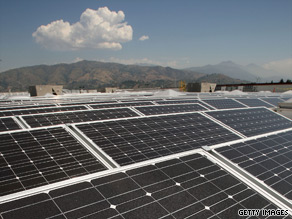CNN
BAGHDAD, Iraq (CNN) -- I've spoken to doctors in Baghdad before, but never one this optimistic.

Solar panels similar to these are bringing renewable and regular power to two clinics in Iraq.
When I interviewed Dr. Thamer Al-Musawi, he told me his clinic is offering new hope to their patients. Not because of any new medicines housed inside. But because of the high tech equipment placed on the outside -- 64 solar panels to be precise.
About 4 months ago, they were installed on the roof of the Al-Dakhil Medical Center, where Dr. Thamer works, as part of a project being underwritten by the U.S. Military and supported by Iraq's Health Ministry.
Only two other clinics in all of Iraq have been given access to the same technology.
Dr. Thamer excitedly explained its significance.
"It means we can give our patients the care and medical aid they need," he said, "and we can do it 24 hours a day."
Round the clock medical care may not sound like anything special, but in Iraq, where the power grid is unreliable and blackouts are frequent, most clinics can open only a few hours a day.
And that's not the worst of it. Without dependable electricity, Dr. Thamer explained, certain medications can't be kept at the right temperatures.
At one point, Al-Dakhil even had to cancel their children's vaccine program because the vaccinations couldn't be stored properly.
That all changed with the arrival of the panels -- for a few months at least. The clinic recently suffered a setback. Before we visited, someone tampered with a key circuit board and that's preventing the clinic from using electricity still being stored in the batteries.
Until it's fixed, Al-Dakhil is back to using what most other clinics must use, expensive and polluting diesel generators.

But that hasn't dampened Dr. Thamer's enthusiasm. He fully expects the solar panels will be powering the clinic again within a few days. As a doctor in Baghdad, he's faced far worse, and he's determined to overcome this challenge.
More than anything, he simply wants to make sure his patients can get access to the best care possible.
 Sit tight, we're getting to the good stuff
Sit tight, we're getting to the good stuff
